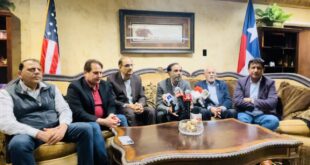Dr. Qaisar Abbas
(Dr. Qaisar Abbas has worked at several American universities as a Professor of Communication, Assistant Dean and Director. In Pakistan, he worked for PTV as News Producer, and Information Officer inPunjab. He frequently writes on international relations, mass media, and South Asian affairs).
The Bahrain Economic Workshop has been concluded recently to develop economic plans for Palestinians entitled “Peace to Prosperity: A New Vision for the Palestinian People and the Broader Middle East.” President Trump’s son-in-law Jared Kushner, who is also his SeniorAdvisor, spearheaded the workshop.
The states thatplayed aleading role in the Workshop were Saudi Arabia, Egypt, Jordan, and the United Arab Emirates. Other participants were businessmen from Israel and the Middle East, global corporations, banks, intellectuals, and journalists who shared the same views as its organizers. Lebanon, Kuwait, Syria, and several Arab states, however, did not attend the event.
Most importantly, the Palestinian Authority refused to the Workshop while Israel’s participation was not part of the plan.
To some observers, the Workshop left several questions unanswered, especially related to sovereignty, human rights, and economic progress of Palestinians.
The proposed plan presented at the Workshop included two sections. The first section identified its goals and further elaborated the primary justifications of the proposed project. It included highlights of the development plans, self-determination of Palestinians, and their empowerment. The second part included economic plans for Palestinians for the next ten years, costs of these projects, the related data, loans, and grants.
Overall, 199 projects were focused on Palestinians with a cost of $27.8 billion, and the rest of 167 projects were devoted to Jordan, Lebanon, and Egypt with a price tag of $22.2 billion. Most of the Palestinian projects were related to training, agriculture, manufacturing, residential projects, and tourism.
Besides the cosmetic finesse and wonderful terminologies, however, the document fell short of addressing real issues of the Palestinian population.
Ibrahim Shikaki, Assistant Professor of Economics at Trinity College,cites two significant drawbacks of the project. First, the new plan is not different from previous projects. And second, it widely ignores Palestinian’s political issues and economic hardships. For him, the project presented in the workshopfails to recognize the territorial rights of Palestinians. “The word ‘Palestinians’ is mentioned301 times,yet none of those instances mention Palestinian land, territory, state, or authority,”he articulates.
The plan included private businesses and ignored participation of Palestinian authorities altogether. With this approach, the projects presented at the Workshop shunned Palestinian’s economic, social, and political realities of the day.
The timing and the very structureof the Workshop also indicate global perspectives. Although the U.S. policies always favored Israel, Washington started supporting the Israeli occupation and marginalization of Palestinians openly after President Donald Trump came to power.
Despite the United States insistence that Palestinians should come to the negotiating table,it has been supporting Israel on legalizing its occupation of Palestinian territories. It has also recognized Jerusalem as the new capital of Israelby moving its embassy to the disputed area and closedthe Palestinian office in Washington DC.
Probably for these reasons, known Palestinian leader and human rights activist Hanan Ashrawi, had already warned before the Workshop that it “would do nothing but divert attention from real issues of the Palestinian population in the area.”
As it looks, any plan to improve economic conditions of Palestinians will be incomplete without addressing the real issues of human rights, self-determination, and economic marginalization of the Palestinian population.
Historically, this is not a new attempt to address economic issues of the territory. There were at least four similar projects proposed during the last 15 years, and all of them died along with the long list of documents and the impressive data presented.
The fate of this new plan appears to be no different than the previous projects as it offers nothing new to break the current deadlock. Or maybe it has been designed to achieve some hidden objectives behind the dazzling projects?
The Workshop has further strengthened American relations with some Middle Eastern states against the Iranian influence in the region, and that appears to beits real goal.
 Jago Times "English Edition" Best Online Newspaper
Jago Times "English Edition" Best Online Newspaper
